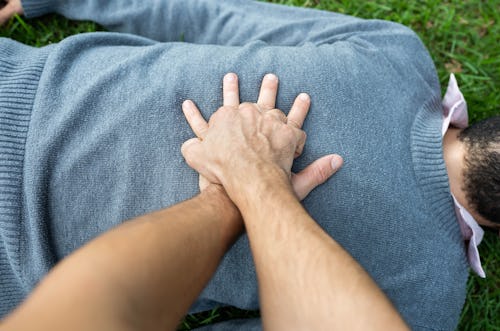
In America, minorities too often receive the short end of the stick when it comes to housing, employment, and health care — and the disparities only seem to be growing. Discrimination is simply part of daily life for a person of color in this country. Still, it comes as a bit of a shock that even in an emergency, life is notably harder for those of us with more melanin. A recent study has found that bystanders are more likely to give CPR to a white person who clearly needs it.
The study, done by the American College of Cardiology, found that Black and Hispanic people who experience a cardiac arrest (when the heart suddenly stops beating) at home or in public are significantly less likely than white people to receive cardiopulmonary resuscitation, or CPR, from a bystander. Researchers looked at over 100,000 cardiac arrests in the United States between 2013 and 2019 that occurred outside of a hospital but were witnessed by a bystander. The study found that when a cardiac arrest occurred in public, 60% of white people received CPR, only 46% of Black and Hispanic people received the same treatment.
The at-home statistics are even more disheartening: 39% of Black and Hispanic people received CPR compared with 47% of white people. Study authors stated that the patterns were the same regardless of the racial makeup or income level of the neighborhood where the cardiac arrest occurred, so we can’t blame what’s happening on class structure like we usually do.
“We found that bystander CPR rates are much higher in white communities compared with Black communities,” said the study’s senior author Paul S. Chan, a professor of medicine at the University of Missouri–Kansas City School of Medicine and the Saint Luke’s Mid America Heart Institute.
Chan added that this disparity wasn’t only present in majority white communities, but also in majority Black and Hispanic communities. “A white person going into cardiac arrest in a community that was more than 50% Black and Hispanic was still more likely to get bystander CPR than a Black or Hispanic person in that community,” he said. This seems to indicate that it’s more than people of color not knowing how to give CPR to each other, but that Black and brown folks would more likely give a white person CPR. I simply have no words.
Nearly 356,000 Americans suffer from cardiac arrest outside of a hospital yearly, which is about 1,000 every day, and most occur at home. Researchers found overall rates of CPR were relatively low across all racial groups in the study, and even though bystanders were present in all cases, data showed CPR was attempted less than half the time. Combine this info with the fact that 54% of Americans don’t actually know how to give CPR correctly and that equals a whole lot of lives that could’ve been saved had we all taken the time out to learn. I’ve personally dealt with an emergency situation at home and everyone turned out okay. But had that person needed CPR, I couldn't have given it to them because I don’t know how. I should, and you should too.
In the interest of helping other people of color like me without CPR knowledge, the American Heart Association has a convenient course search tool on their website. Also, if preferred, The Red Cross and others have an online certified CPR training course that interested parties can take through Zoom as well. There’s really no excuse — those of us who claim to have empathy should think ahead and learn how to perform CPR to turn these statistics around.







